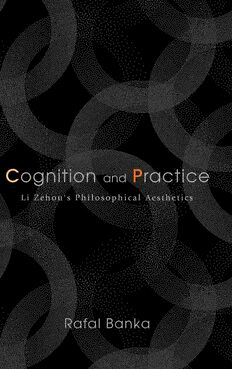
Cognition and Practice: Li Zehou's Philosophical Aesthetics PDF
Preview Cognition and Practice: Li Zehou's Philosophical Aesthetics
Cognition and Practice SUNY series in Chinese Philosophy and Culture ————— Roger T. Ames, editor Cognition and Practice Li Zehou’s Philosophical Aesthetics Rafal Banka Published by State University of New York Press, Albany © 2022 State University of New York All rights reserved Printed in the United States of America No part of this book may be used or reproduced in any manner whatsoever without written permission. No part of this book may be stored in a retrieval system or transmitted in any form or by any means including electronic, electrostatic, magnetic tape, mechanical, photocopying, recording, or otherwise without the prior permission in writing of the publisher. For information, contact State University of New York Press, Albany, NY www.sunypress.edu Library of Congress Cataloging-in-Publication Data Name: Banka, Rafal, 1976– author. Title: Cognition and practice : Li Zehou’s philosophical aesthetics / Rafal Banka. Description: Albany : State University of New York Press, [2022] | Series: SUNY series in Chinese philosophy and culture | Includes bibliographical references and index. Identifiers: LCCN 2022005651 | ISBN 9781438489230 (hardcover : alk. paper) | ISBN 9781438489254 (ebook) Subjects: LCSH: Li, Zehou. | Aesthetics, Chinese. | Cognition. Classification: LCC B5234.L4874 B36 2022 | DDC 170.92—dc23/eng/20220323 LC record available at https://lccn.loc.gov/2022005651 10 9 8 7 6 5 4 3 2 1 Contents Acknowledgments vii Introduction 1 Chapter 1 Confucian Inspiration 7 Chapter 2 Marxist Framework 23 Chapter 3 Reinterpreting Kant 37 Chapter 4 Philosophy of Subjectality 69 Chapter 5 Situating Subjectality 95 Chapter 6 Beauty 111 Chapter 7 Aesthetic Experience 125 Chapter 8 An Alternative Account of Aesthetic Experience: John Dewey 161 Chapter 9 Contemporary Experience-Based Aesthetics 177 Afterword 191 Notes 195 vi CONTENTS Bibliography 217 Index 225 Acknowledgments Nothing is born in vacuum. This book would not be published without help of many people. I would like to thank Roger Ames, editor of the SUNY Press series in Chinese Philosophy and Culture, James Peltz, SUNY Press associate director and editor in chief, as well as the anonymous reviewers who have made my project see the light of publication. I also convey my debt to the Charles Wei-hsun Fu Foundation and the International Society for Chinese Philosophy, who in 2015 jointly granted me a Junior Faculty Award for an article that was a prelude for a longer study completed as this very book. I offer my deep thanks to Jinhua Jia and, again, Roger Ames, who invited me to participate in the conference “Li Zehou and Confucian Philosophy,” which took place at the University of Hawai‘i at Mānoa in autumn 2015. It was an excellent exchange that led me to a comprehensive study of the liaisons of practice and cognition in Li Zehou’s philosophical aesthetics. I am deeply thankful to Anna I. Wojcik, my former MA and PhD theses supervisor, for inspiring lectures in classical Chinese aesthetics, without which I might not have developed interest in this part of Chinese philosophy. I also express my regards to Szymon Szymczak, the most inspiring logician that I have met. Last but not least, I would like to thank my wife Jinli He for being a patient yet sincere critic and continuous supporter of what I do. The project described in this book has been funded by the National Science Centre of Poland, funding scheme: Sonata 12 (project registration no. 2016/23/D/HS1/02451). vii Introduction This book aims to present Li Zehou’s aesthetics as a form of cognition. There are two reasons for undertaking this project. The general motivation is to present the aesthetics of Li Zehou, one of the most influential living Chinese philosophers, to the Western audience. Li lived from 1930 to 2021. He studied philosophy at Peking University and was a former professor of the Chinese Academy of Social Sciences. He was active as a philosopher since the 1950s. His writings became particularly influential among Chinese intellectuals in the 1980s, a period often referred to as Chinese Cultural Fever (Zhongguo Wenhua Re 中國文化熱), when the monolithic discourse of social realism became replaced with cultural pluralism, which among others included qualitative changes in widely understood aesthetics. Li is particularly known for proposing an original aesthetic theory founded on anthropological ontology, otherwise known as the philosophy of subjectality, but his work devoted to Kant’s thought as well as the history of Chinese philosophy is no less important due to his specifically conceived approach to historical materialism. While Li’s influence on contemporary Chinese philosophy, and more generally humanities in mainland China, is vast and can be counted in decades, he is hardly recognized beyond Chinese-speaking academia. It must be admitted that Li is not completely unknown among Western scholars. However, one should observe at the same time that in Western academia, Li’s writings are known almost entirely among scholars who work in sinology or what may be broadly construed as Chinese studies. This shows that Li’s philosophy practically passes unnoticed in the realm of academia that is unrelated to studies connected with Chi- nese civilization. This is also the case of Western philosophy scholars who, when they refer to the Chinese tradition, usually focus on Confucianism and Daoism. While the importance of these classical Chinese philosophy 1
